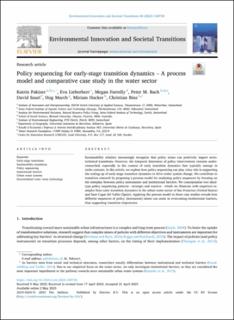Please use this identifier to cite or link to this item:
https://doi.org/10.21256/zhaw-28499| Publication type: | Article in scientific journal |
| Type of review: | Peer review (publication) |
| Title: | Policy sequencing for early-stage transition dynamics : a process model and comparative case study in the water sector |
| Authors: | Pakizer, Katrin Maria Lieberherr, Eva Farrelly, Megan Bach, Peter M. Saurí, David March, Hug Hacker, Miriam Binz, Christian |
| et. al: | No |
| DOI: | 10.1016/j.eist.2023.100730 10.21256/zhaw-28499 |
| Published in: | Environmental Innovation and Societal Transitions |
| Volume(Issue): | 48 |
| Issue: | 100730 |
| Issue Date: | 2023 |
| Publisher / Ed. Institution: | Elsevier |
| ISSN: | 2210-4224 2210-4232 |
| Language: | English |
| Subjects: | Early-stage transition; Institutional barrier; Policy sequencing; Urban water system; Decentralized water reuse technology; Sustainability transition |
| Subject (DDC): | 338.927: Environmental economics and sustainable development |
| Abstract: | Sustainability scholars increasingly recognize that policy mixes can positively impact socio-technical transitions. However, the temporal dimension of policy interventions remains under-researched, especially in the context of early transition dynamics that typically emerge in niche contexts. In this article, we explore how policy sequencing can play a key role in supporting the scaling-up of early-stage transition dynamics to drive wider system change. We contribute to transition research by proposing a process model for analyzing policy sequences by focusing on the interplay between policy instruments and institutional barriers. We conceptualize two ideal-type policy sequencing patterns - strategic and reactive - which we illustrate with empirical examples from early transition dynamics in the urban water sector of San Francisco (United States) and Sant Cugat del Vallès (Spain). Applying the process model to these case studies reveals how different sequences of policy (instrument) mixes can assist in overcoming institutional barriers, thus supporting transition trajectories. |
| URI: | https://digitalcollection.zhaw.ch/handle/11475/28499 |
| Fulltext version: | Published version |
| License (according to publishing contract): | CC BY 4.0: Attribution 4.0 International |
| Departement: | School of Management and Law |
| Organisational Unit: | Institute of Innovation and Entrepreneurship (IIE) |
| Appears in collections: | Publikationen School of Management and Law |
Files in This Item:
| File | Description | Size | Format | |
|---|---|---|---|---|
| 2023_Pakizer-etal_Policy-sequencing-for-early-stage-transition-dynamics-case-study-water-sector.pdf | 3.74 MB | Adobe PDF |  View/Open |
Show full item record
Pakizer, K. M., Lieberherr, E., Farrelly, M., Bach, P. M., Saurí, D., March, H., Hacker, M., & Binz, C. (2023). Policy sequencing for early-stage transition dynamics : a process model and comparative case study in the water sector. Environmental Innovation and Societal Transitions, 48(100730). https://doi.org/10.1016/j.eist.2023.100730
Pakizer, K.M. et al. (2023) ‘Policy sequencing for early-stage transition dynamics : a process model and comparative case study in the water sector’, Environmental Innovation and Societal Transitions, 48(100730). Available at: https://doi.org/10.1016/j.eist.2023.100730.
K. M. Pakizer et al., “Policy sequencing for early-stage transition dynamics : a process model and comparative case study in the water sector,” Environmental Innovation and Societal Transitions, vol. 48, no. 100730, 2023, doi: 10.1016/j.eist.2023.100730.
PAKIZER, Katrin Maria, Eva LIEBERHERR, Megan FARRELLY, Peter M. BACH, David SAURÍ, Hug MARCH, Miriam HACKER und Christian BINZ, 2023. Policy sequencing for early-stage transition dynamics : a process model and comparative case study in the water sector. Environmental Innovation and Societal Transitions. 2023. Bd. 48, Nr. 100730. DOI 10.1016/j.eist.2023.100730
Pakizer, Katrin Maria, Eva Lieberherr, Megan Farrelly, Peter M. Bach, David Saurí, Hug March, Miriam Hacker, and Christian Binz. 2023. “Policy Sequencing for Early-Stage Transition Dynamics : A Process Model and Comparative Case Study in the Water Sector.” Environmental Innovation and Societal Transitions 48 (100730). https://doi.org/10.1016/j.eist.2023.100730.
Pakizer, Katrin Maria, et al. “Policy Sequencing for Early-Stage Transition Dynamics : A Process Model and Comparative Case Study in the Water Sector.” Environmental Innovation and Societal Transitions, vol. 48, no. 100730, 2023, https://doi.org/10.1016/j.eist.2023.100730.
Items in DSpace are protected by copyright, with all rights reserved, unless otherwise indicated.